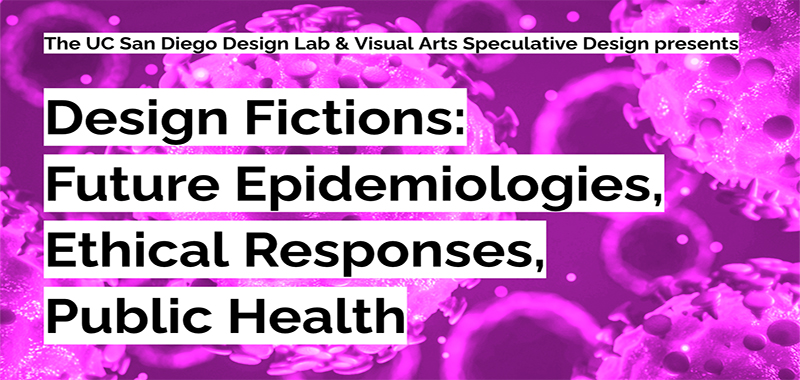Sep 9, 2020–Sep 9, 2020 from 1:00pm–3:00pm
Design Fictions: Future Epidemiologies, Ethical Responses, Public Health

Design Fictions are a critical design tool for thinking otherwise about the past, present and future. Sci-fi author Bruce Sterling says that design fictions “suspend disbelief about change." Constructing fictional narratives in various media (from films to texts, from data graphics to powerpoints, from prototypes to maps) helps designers think through complex phenomena and explore how various systems might interact. Design fictions shape design paths by investigating and inspiring possible worlds.
Design Fictions: Future Epidemiologies, Ethical Responses, Public Health will use design fiction methods to consider ethical responses for epidemiological futures. It invites participation from those who want to learn about design fictions and/ or those interested in exploring outcomes of the current pandemic.
Wednesdays 1:00–3:00 p.m.
Sept 2 w/ Benjamin Bratton | The Revenge of The Real: Functions for Speculation
Sept 9 w/ Pinar Yoldas | Omnipolis, Social trust, Planetary Health
Sept 16 w/ Lisa Cartwright | Health Surveillance Infodemic: Design Fiction by Numbers
Sept 23 w/ Camille Nebeker | Imagining the ethical, legal and social implications of digital contact tracing
This series is open to all, with first priority given to Design Lab members, Design students, and students in the Speculative Design and Visual Arts programs. No previous experience with Design Fictions or epidemiology is required.
Space is limited. Please register by August 30th for some or all sessions https://forms.gle/WfGXYxtoJjtLhmkS6
Zoom links will be shared with registrants prior to the event.
Design Fictions is produced by The UC San Diego Design Lab Community Team in partnership with the Visual Arts Speculative Design program.
Session Details
Sept 9 w/ Pinar Yoldas
Omnipolis, Social trust, Planetary Health
Today’s speculation is tomorrow’s reality.
We start with the realization that urban structures around us were once as speculative as moon establishment Luna in the popular sci fi series Expanse (James S. A. Corey), the North Shore towns of Arkham (H.P. Lovecraft) or the Walking Cities by Archigram. Through an analysis of environmental and urban parameters that allowed the pandemic to grow and spread to its current level, we will speculate on contagion-free environments and what this notion could look like if applied at an urban scale.
Concepts such as rewilding and omnipolis (self-sufficient, self-operating cities) by Paul Virilio will be introduced as guiding principles for establishing new urban structures and the social conditions upon which they depend on. What environments and habitats would we create if we employed the power of design to focus on “planetary health,” “public health” and “social trust” as opposed to other determining social and cultural pressures. Through discussions and hands on design assignments we will derive three different environments which could pave the way to a contagion-free living.
Pinar Yoldas is an infra-disciplinary designer/artist/researcher. Her work develops within biological sciences and digital technologies through architectural installations, kinetic sculpture, sound, video and drawing with a focus on post-humanism, eco-nihilism, anthropocene and feminist technoscience. She is an Assistant Professor of Visual Arts at UC San Diego.
Date and Time
Sep 9, 2020–Sep 9, 2020
from 1:00pm–3:00pm
Location
Zoom
Event Registration
Registration for this event is required
by .
Visit the registration page for details.
Event Fee
Free
Contact
Nick Lesley • nlesley@ucsd.edu
Audience
Faculty, Staff, Students, The General Public
Event Host
Visual Arts